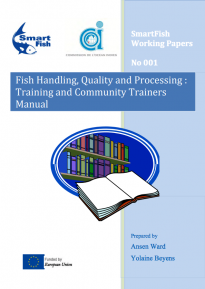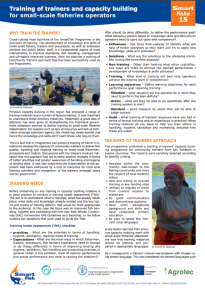Skills and Knowledge for Artisanal Fish Salting
Some of the key skills and knowledge required in order to prevent and reduce food loss and waste (FLW) and improve standards and quality during artisanal fish salting include:
- Maintaining fish quality
- Use of salt and salting process
- Good storage practice
- Pest Control and Waste Disposal management
- Packaging
- Labelling
- Regulatory requirements/standards
- Good hygienic practice and personal hygiene
- Good manufacturing practices
National authorities such as Health Inspectorates and Food Standard Agencies require the skills and knowledge to be able to implement extension for processors and the enforcement of food law, regulations, standards and certification.
Key Publications
Fish Handling, Quality and Processing: Training and Community Trainers Manual This document includes information related to food law implementation. |
| |
Training of trainers and capacity building for small-scale fisheries operators Information on why training small-scale fisheries trainers is important is discussed, and approaches and paths forward are included. | ||
Introduction to Good Hygiene and Good Fish Handling Practices Smartfish Project in collaboration with CVF and the FAO-IGAD Fish Trade Project presents: Clean Fish Better Life, a video training package on good fish handling, processing and cooking for fisheries operators and consumers. |
More Resources
More Resources
27 February 2024
31 October 2023
05 September 2023














